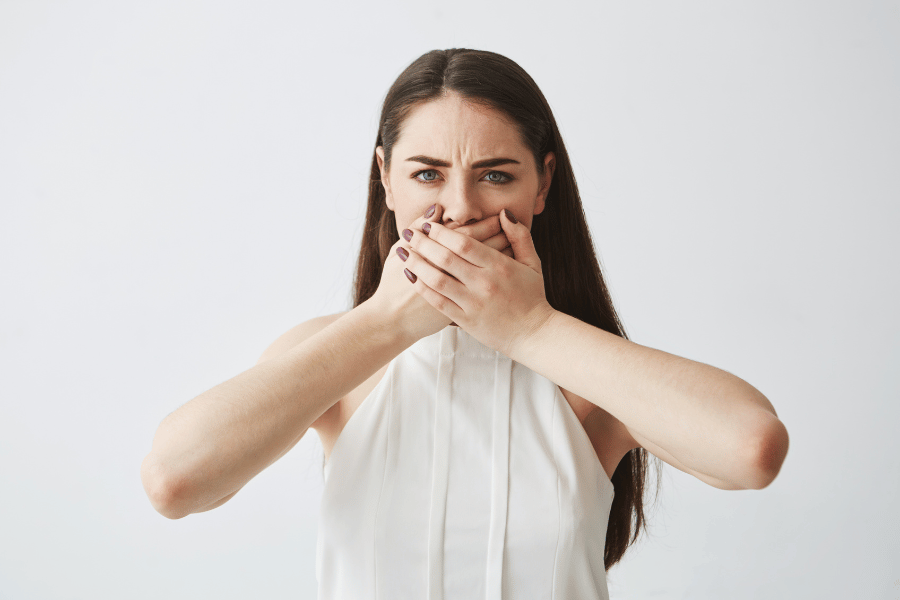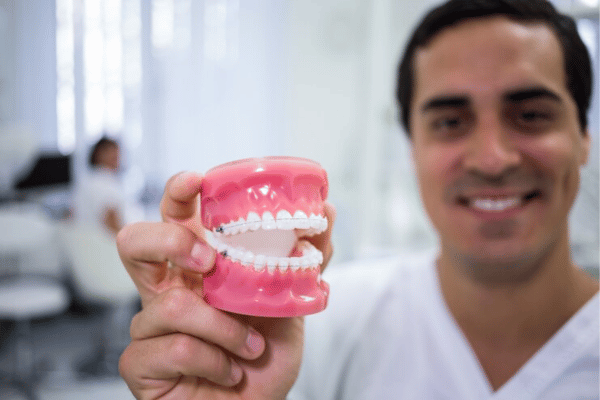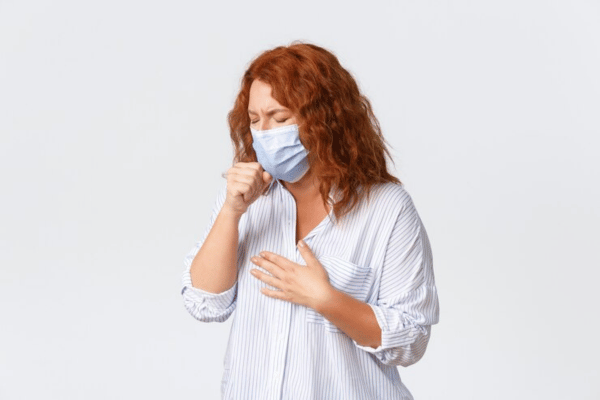
Table of contents
Bad breath or halitosis, can become embarrassing and affect your confidence during social interactions. While you may be familiar with common culprits like poor oral hygiene or certain foods, some lesser-known factors could be contributing to your dragon breath. Let's find out some unexpected causes of bad breath that might just surprise you.
1. Sinus Issues

Believe it or not, your sinuses can affect how your breath smells. When you have infections or allergies, they can make your sinuses inflamed or blocked. This can lead you to breathe through your mouth instead of your nose, which stops your nose from cleaning the air.
As a result, your mouth can become dry, making it a perfect place for bacteria to grow. This bacterial imbalance can cause bad breath that won't go away until you treat the sinus problem. Thus, addressing sinus issues through medication, nasal irrigation, or allergy management is essential for tackling halitosis at its root cause.
2. Medications

Saliva plays a vital role in oral hygiene by washing away food particles and counteracting acids in the mouth. However, many medications, whether they're prescribed by a doctor or bought over-the-counter, can cause dry mouth as a side effect. Hence, when the production of saliva decreases due to medication, it creates an environment where bacteria can flourish, resulting in unpleasant-smelling breath.
If you find yourself dealing with dry mouth caused by medication, it's crucial to reach out to your healthcare provider for guidance on potential solutions to resolve this issue. They can help explore alternatives or adjustments to your medication regimen to mitigate dry mouth and its associated effects on breath odor.
3. Teeth Straightening Treatments

Getting a straighter smile through teeth straightening treatments like clear aligners or metal braces can lead to many benefits, including improved confidence and better oral health. However, it's important to be aware that these treatments can sometimes result in bad breath.
Both clear aligners and metal braces can create an environment where bacteria thrive if not properly cleaned. With clear aligners, their snug fit can trap food particles and plaque, leading to the growth of odor-causing bacteria and bad breath over time. Similarly, metal braces can also contribute to bad breath due to their design, which can make cleaning more challenging.
To maintain fresh breath during your teeth straightening journey, it's essential to prioritize proper oral hygiene. Clean your aligners or braces thoroughly at least twice a day using recommended cleaners or antibacterial solutions. Additionally, stick to a regular oral hygiene routine: brush your teeth after meals, floss daily, and rinse with mouthwash.
Drinking enough water helps too, as it prevents dry mouth and encourages saliva production, which naturally cleanses your mouth. By taking these steps, you can enjoy a fresh and healthy smile throughout your teeth-straightening journey.
4. Low-Carb Diets

While low-carb diets like keto have gained popularity for weight loss, they can also lead to unpleasant breath. When the body enters a state of ketosis, a metabolic process that occurs when carbohydrate intake is drastically reduced, it begins to burn fat for fuel instead of glucose.
This metabolic shift leads to the production of ketones, which are acidic compounds. As these ketones accumulate in the bloodstream, they can be released through the breath, resulting in a fruity or metallic odor that can be particularly noticeable to those around you.
To help with this, drink plenty of water to flush out the ketones from your body and keep your mouth hydrated. Also, make sure to brush your teeth, floss, and use mouthwash regularly to keep your breath fresh. If you're worried about your breath, talk to a doctor or dietitian for advice.
5. Respiratory Infections

When you're feeling under the weather with a cold, flu, or other respiratory infections, bad breath can often be an unwelcome companion to your symptoms. This happens because the bacteria responsible for these infections can produce sulfur compounds, which contribute to the foul odor in your breath.
As your body fights off the infection, these bacteria can multiply, making the bad breath more noticeable. Additionally, factors like nasal congestion, post-nasal drip, and dry mouth, which are common during respiratory illnesses, can further exacerbate the problem.
To help with this, you can try a few things. Gargling with salt water is a good idea—it helps kill some of the bacteria in your throat and mouth. Just mix some salt into warm water, gargle it, and then spit it out. Doing this a few times a day can make a difference. Remember, being sick is tough, but taking care of your breath can make you feel a bit better while you're getting better.
6. Digestive Issues

Issues like acid reflux and gastrointestinal disorders can also contribute to bad breath. Acid reflux, also known as gastroesophageal reflux disease (GERD), occurs when stomach acid flows back up into the esophagus. This reflux can lead to a range of symptoms, including heartburn, chest pain, and regurgitation of stomach contents.
In some cases, these stomach acids can also reach the mouth, where they leave behind an unpleasant odor. This acidic environment in the mouth can contribute to bad breath, often described as sour or acidic.
Furthermore, gastrointestinal disorders such as irritable bowel syndrome (IBS), inflammatory bowel disease (IBD), or dysbiosis (an imbalance of gut bacteria) can also impact breath odor. These conditions can disrupt the balance of bacteria in the digestive tract, leading to the production of gases and compounds that may contribute to bad breath.
Managing these underlying conditions is key to improving breath odor. Try to avoid foods that make acid reflux worse, like spicy or fatty foods. Eating smaller meals and not lying down right after eating can help too. If your doctor prescribes medicine for acid reflux or stomach issues, make sure to take it as directed.
7. Tobacco Use

It's no secret that smoking or using tobacco products can wreak havoc on your oral health. Besides staining your teeth and increasing your risk of gum disease, tobacco use can also cause persistent bad breath. This is because the chemicals present in tobacco products tend to linger in your mouth, throat, and lungs, creating an unpleasant odor that's challenging to mask even with oral hygiene practices alone.
When you smoke or use tobacco, these harmful chemicals are absorbed into the tissues of your mouth and throat, where they can remain for extended periods. As a result, the odor they produce can persist long after you've finished smoking or using tobacco products.
8. Underlying Medical Conditions

In some cases, chronic bad breath can be a symptom of an underlying medical condition, such as diabetes, liver disease, or kidney problems. These conditions can produce distinct odors on the breath due to metabolic changes or the release of certain chemicals. If you're experiencing persistent bad breath despite maintaining good oral hygiene, it's essential to consult your healthcare provider to rule out any underlying health issues.
FAQs
1. How can I tell if I have bad breath?
It can be challenging to detect your own bad breath, but common signs include a persistent unpleasant taste or smell in your mouth, dry mouth, and a white coating on your tongue. Asking a trusted friend or family member for their opinion can also help determine if you have bad breath.
2. Can I mask bad breath with breath mints or gum?
Breath mints and gum can temporarily mask bad breath, but they do not address the underlying cause. It's important to practice good oral hygiene and address any underlying issues to effectively manage bad breath.
3. Is bad breath a sign of a serious health condition?
In some cases, persistent bad breath can be a sign of an underlying health issue such as gum disease, diabetes, liver disease, or respiratory infections. If bad breath persists despite proper oral hygiene, it's important to consult a healthcare professional for evaluation.
4. Can certain foods cause bad breath?
Yes, certain foods like onions, garlic, spices, and dairy products can contribute to bad breath. These foods contain sulfur compounds that are released during digestion and can linger in the mouth, causing odor.
5. Is morning breath normal?
Yes, morning breath is normal and is typically caused by reduced saliva production during sleep, allowing bacteria to multiply in the mouth.

